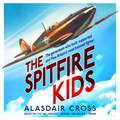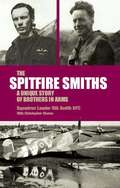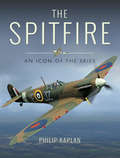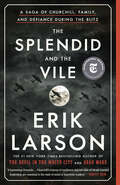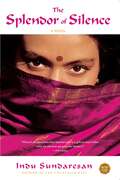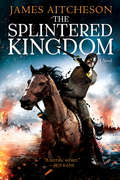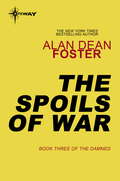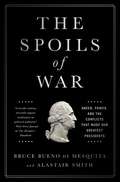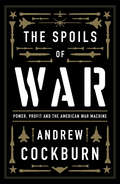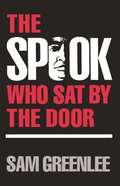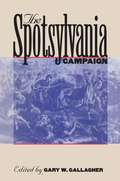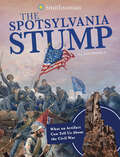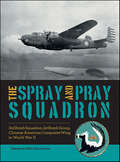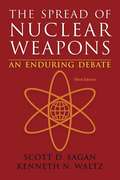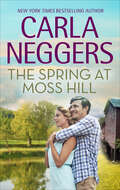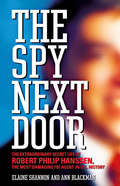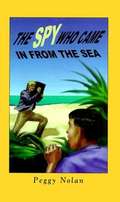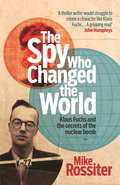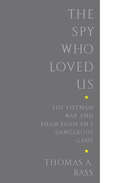- Table View
- List View
The Spitfire Kids: The generation who built, supported and flew Britain's most beloved fighter
by Alasdair Cross BBC Worldwide'An inspirational read celebrating the incredible young people who gave so much for this iconic British aircraft'. John Nichol, bestselling author of Spitfire: A Very British Love StoryDespite the many films and television programmes over the decades since the end of the Second World War that portrays our allied heroes as grown-up men and women, the Battle of Britain was in the main actually fought and won by teenagers. The average age of an RAF fighter pilot was just twenty years old. Many of the men and women who designed and built their planes were even younger. Based on the hit BBC Radio podcast Spitfire: The People's Story, we use contemporary diaries and memoirs, many of them previously unpublished, to tell the story of the Spitfire through the voices of the teenagers who risked everything to design, build and fly her. This isn't a story of stiff-upper lips, stoical moustaches and aerial heroics; it's a story of love and loss, a story of young people tested to the very limits of their endurance. Young people who won a battle that turned a war.(P)2021 Headline Publishing Group Limited
The Spitfire Smiths: A Unique Story of Brothers in Arms
by Christopher Shores Rod SmithA posthumous autobiography, culled from a partial manuscript and notes, by Canada&’s World War II fighter ace and his equally heroic brother. In late 2001 Rod Smith died tragically at his own hand, leaving behind a part-written autobiography and many notes. His friend, the historian Christopher Shores, took on the task of seeking to complete the story as nearly as possible to how he believed Rod had wished it to be. Rod and his brother Jerry both became Spitfire pilots during World War II, leaving their home in Canada only to find themselves—purely by chance—serving together in the defense of Malta during 1942. Jerry had already gained some fame as the first pilot ever to land a Spitfire on an aircraft carrier. Both showed immediate promise as fighter pilots, but by the end of that year Jerry was dead—last seen chasing a German bomber out to sea—while Rod had become an &“ace&” and would receive the D.F.C. Two years later, serving as a squadron commander in Western Europe, he claimed six Messerschmitts down within a single week, and was involved in the shooting down of the first German jet aircraft to fall to British Commonwealth fighters. He ended the war as one of Canada&’s highest scoring aces, with more than 13 victories to his credit. After the war, he qualified as both an aeronautical engineer and a barrister. His untimely death was a great loss not only to his family and friends, but to the wider world of aviation history as well. This book, containing many diary entries from each of the brothers, is a testament to them.
The Spitfire: An Icon of the Skies
by Philip Kaplan&“An amazing tribute to the people who designed, built and flew it—a comprehensive history of one of the most beautiful aircraft ever manufactured.&”—Books Monthly The magnificent Vickers Supermarine Spitfire, together with its able partner the Hawker Hurricane, saved Britain from Nazi invasion in the summer of 1940 and irrevocably changed the course of the Second World War. This book from Philip Kaplan celebrates one of history&’s most important weapons in a glorious new light. A British national icon, the Spitfire is the best-known symbol of the war years for generations of Britons. From the deep, haunting growl of its Rolls-Royce engine, to the elegant style of its elliptical wing, it is perhaps the most famous and revered combat airplane ever built. Kaplan investigates just what it is that fuels the Spitfire&’s compelling mystique. During wartime, it held an unrivaled reputation amongst Allied and Axis airmen. Today, it continues to hold aviation enthusiasts in thrall. Kaplan highlights the immeasurable contributions of Spitfire designers Reginald J. Mitchell and Joseph Smith, test pilots Jeffrey Quill, Mutt Summers and Alex Henshaw, and ace Spitfire pilots including Al Deere, Sailor Malan and Pierre Clostermann. All added to the legend of this lovely, but deadly, little fighter. &“Can be considered a &‘Potted History&’ of the Spitfire and its military and civilian service, with particular emphasis being placed on the restoration of AR213. On that basis it will probably appeal to Spitfire aficionados in particular and to aviation and war-bird enthusiasts in general.&”—NZ Crown Mines
The Splendid and the Vile: A Saga of Churchill, Family, and Defiance During the Blitz
by Erik Larson#1 NEW YORK TIMES BESTSELLER • The author of The Devil in the White City and Dead Wake delivers an intimate chronicle of Winston Churchill and London during the Blitz—an inspiring portrait of courage and leadership in a time of unprecedented crisis &“One of [Erik Larson&’s] best books yet . . . perfectly timed for the moment.&”—Time • &“A bravura performance by one of America&’s greatest storytellers.&”—NPR NAMED ONE OF THE BEST BOOKS OF THE YEAR BY The New York Times Book Review • Time • Vogue • NPR • The Washington Post • Chicago Tribune • The Globe & Mail • Fortune • Bloomberg • New York Post • The New York Public Library • Kirkus Reviews • LibraryReads • PopMattersOn Winston Churchill&’s first day as prime minister, Adolf Hitler invaded Holland and Belgium. Poland and Czechoslovakia had already fallen, and the Dunkirk evacuation was just two weeks away. For the next twelve months, Hitler would wage a relentless bombing campaign, killing 45,000 Britons. It was up to Churchill to hold his country together and persuade President Franklin Roosevelt that Britain was a worthy ally—and willing to fight to the end. In The Splendid and the Vile, Erik Larson shows, in cinematic detail, how Churchill taught the British people &“the art of being fearless.&” It is a story of political brinkmanship, but it&’s also an intimate domestic drama, set against the backdrop of Churchill&’s prime-ministerial country home, Chequers; his wartime retreat, Ditchley, where he and his entourage go when the moon is brightest and the bombing threat is highest; and of course 10 Downing Street in London. Drawing on diaries, original archival documents, and once-secret intelligence reports—some released only recently—Larson provides a new lens on London&’s darkest year through the day-to-day experience of Churchill and his family: his wife, Clementine; their youngest daughter, Mary, who chafes against her parents&’ wartime protectiveness; their son, Randolph, and his beautiful, unhappy wife, Pamela; Pamela&’s illicit lover, a dashing American emissary; and the advisers in Churchill&’s &“Secret Circle,&” to whom he turns in the hardest moments. The Splendid and the Vile takes readers out of today&’s political dysfunction and back to a time of true leadership, when, in the face of unrelenting horror, Churchill&’s eloquence, courage, and perseverance bound a country, and a family, together.
The Splendor of Silence: A Novel
by Indu SundaresanSet in India during four searing pre-monsoon days in May 1942, The Splendor of Silence is internationally bestselling author Indu Sundaresan's most unforgettable accomplishment yet, merging her Indian and American backgrounds into a heartrending tale of love and clashing cultures in a time of war. Sam Hawthorne, a twenty-five-year-old U.S. Army captain, arrives at the princely state of Rudrakot in search of his missing brother, Mike, carrying with him wounds from combat in Burma and several secrets. But Sam's mission is soon threatened by the unlikeliest of sources -- he falls hopelessly in love with Mila, daughter of the local political agent. Mila, unexpectedly attracted to Sam, nurtures a secret of her own and finds herself torn between loyalty to her family and Sam. The Splendor of Silence opens twenty-one years later with Olivia, Sam's daughter, receiving a trunk of treasures from India, along with a letter from an unknown narrator that finally fills all the silences of her childhood -- telling her the story of her parents' passionate and enduring love for each other that throws them in the path of racial prejudice, nationalist intrigue, and the explosive circumstances of a country and a society on the brink of independence from British rule. Sweeping and poignant, reminiscent of Paul Scott's Raj Quartet novels, The Splendor of Silence will draw a host of devoted new fans to this hugely gifted storyteller.
The Splintered Kingdom
by James AitchesonThe brilliant second novel in James Aitcheson's trilogy of the Norman Conquest of England.Summer, 1070. Renowned for his valor in the battle for York, Tancred a Dinant is now a lord in his own right, with knights of his own to command and a manor to call home in the turbulent Welsh borderlands. But his hard-fought gains are soon threatened, as a coalition of enemies both old and new prepares to march against King William.With English, Welsh and Viking forces gathering, and war looming, the Normans are forced to make common cause with some unlikely allies in defence of their newly conquered realm. For Tancred, meanwhile, there are also enemies closer to home: Norman barons envious of his fame, who regard him as a threat to their own power and who are only too eager to see him brought low. Amidst the turmoil, Tancred is chosen to spearhead a perilous expedition into the heart of Wales. Success will bring him glory beyond his dreams. Failure will mean the ruin of the reputation that he has worked so hard to forge. As shield-walls clash and the kingdom burns, not only is his destiny at stake, but also that of England itself.A gripping tale of battle, honor, and vengeance, The Splintered Kingdom is an epic saga of the struggle for England-and through it, the western world.
The Spoils of War: 3 (Damned)
by Alan Dean FosterAfter millennia of relentless war, the union of alien races called the Weave was on the verge of winning a decisive victory - thanks to their new allies from Earth, who in a mere handful of centuries had proved masters of combat. But then the birdlike Wais scholar Lalelelang found disturbing evidence that Humans might not adapt so easily to peace - that natural Human aggression would next be turned against the Weave, unless they were once again confined to fight amongst themselves.When her field research revealed the existence of a secret group of powerfully telepathic Humans called the Core, it looked as if Lalelelang would be the first victim in a new war between Humans and their allies. But just as her fate was sealed, a lone Core commander took a chance on her intelligence and compassion, gambling the fate of Humanity on the possibility that together they could both find an alternative to a galaxy-wide bloodbath...
The Spoils of War: Greed, Power, and the Conflicts That Made Our Greatest Presidents
by Bruce Bueno de Mesquita Alastair SmithWhy are America's most beloved presidents also our most dangerous?It's striking how many of the presidents Americans venerate-Abraham Lincoln, George Washington, Franklin D. Roosevelt, and John F. Kennedy, to name a few-oversaw some of the republic's bloodiest years. Perhaps they were driven by the needs of the American people and the nation. Or maybe they were just looking out for themselves.This revealing and entertaining book puts some of America's greatest leaders under the microscope, showing how their calls for war, usually remembered as brave and noble, were in fact selfish and convenient. In each case, our presidents chose personal gain over national interest while loudly evoking justice and freedom. The result is an eye-opening retelling of American history, and a call for reforms that may make the future better.Bueno de Mesquita and Smith demonstrate in compelling fashion that wars, even bloody and noble ones, are not primarily motivated by democracy or freedom or the sanctity of human life. When our presidents risk the lives of brave young soldiers, they do it for themselves.
The Spoils of War: Power, Profit and the American War Machine
by Andrew CockburnWhy Does America Go to War?In the last decades, America has gone to war as supposed defenders of democracy. The War on Terror was waged to protect the west from the dangers of Islamists. US Solders are stationed in over 800 locations across the world to act as the righteous arbiters of the rule of law. In What The Spoils of War Andrew Cockburn brilliantly dissects the intentions behind Washington's martial appetites.The American war machine can only be understood in terms of the "private passions" and "interests" of those who control it - principally a passionate interest in money. Thus, as he witheringly reports, Washington expanded NATO to satisfy an arms manufacturer's urgent financial requirements; the U.S. Navy's Pacific fleet deployments were for years dictated by a corrupt contractor who bribed high-ranking officers with cash and prostitutes; senior marine commanders agreed to a troop surge in Afghanistan in 2017 "because it will do us good at budget time."Based on years of wide-ranging research, Cockburn lays bare the ugly reality of the largest military machine in history: squalid, and at the same time terrifyingly dangerous.
The Spook Who Sat by the Door
by Sam GreenleeThis book is both a satire of the civil rights problems in the United States in the late 60s and a serious attempt to focus on the issue of black militancy.
The Spotsylvania Campaign
by Gary W. GallagherThe Spotsylvania Campaign was a crucial period in the protracted confrontation between Ulysses S. Grant and Robert E. Lee in spring 1864. Approaching the campaign from a variety of perspectives, the contributors to this volume explore questions regarding high command, tactics and strategy, the impact of continuous fighting on officers and soldiers in both armies, and the ways in which some participants chose to remember and interpret the campaign. They offer insight into the decisions and behavior of Lee and of Federal army leaders, the fullest descriptions to date of the horrific fighting at the "Bloody Angle" on May 12, and a revealing look at how Grant used his memoirs to counter Lost Cause interpretations of his actions at Spotsylvania and elsewhere in the Overland Campaign.The contributors are William A. Blair, Peter S. Carmichael, Gary W. Gallagher, Robert E. L. Krick, Robert K. Krick, William D. Matter, Carol Reardon, and Gordon C. Rhea.
The Spotsylvania Stump: What an Artifact Can Tell Us About the Civil War (Artifacts from the American Past)
by John Micklos Jr.The bloody Battle of Spotsylvania Court House took place in May 1864. The frantic back-and-forth fighting at an area now called the Bloody Angle was among the fiercest single-day battles of the entire Civil War. How did the bullet-riddled stump of a once-mighty oak tree there become a symbol of the conflict? What can its story tell us about that day’s battle and the broader history of the Civil War? Readers will out the answers to these questions and discover more of what the Spotsylvania Stump can tell us about history.
The Spray and Pray Squadron: 3rd Bomb Squadron, 1st Bomb Group, Chinese-American Composite Wing in World War II
by Margaret Mills KincannonThe Chinese-American Composite Wing combined Chinese and American pilots, crew, and ground personnel into integrated squadrons
The Spread Of Nuclear Weapons: An Enduring Debate (Third Edition)
by Kenneth N. Waltz Scott Douglas SaganOver the past fifteen years, The Spread of Nuclear Weapons has been a staple in International Relations courses because of its brevity and crystal-clear explanations. The new edition, An Enduring Debate, continues the important discussion of nuclear proliferation and the dangers of a nuclear-armed world. With new chapters on the questions surrounding a nuclear North Korea, Iran, and Iraq and the potential for a world free of nuclear weapons, this Third Edition will continue to generate a lively classroom experience.
The Spring at Moss Hill: A Knights Bridge Christmas The Spring At Moss Hill Red Clover Inn The River House (The Swift River Valley Novels #6)
by Carla NeggersA children’s book illustrator learns to open up when a chance at love enters the picture in this New England romance.Children’s book illustrator Kylie Shaw has found a home in quiet, little Knights Bridge, Massachusetts. No one seems to know her here—and that’s how she likes it. She carefully guards her privacy from her loft in a refurbished nineteenth-century hat factory. And then California private investigator Russ Colton moves in.Russ is in Knights Bridge to keep his client, eccentric Hollywood costume designer Daphne Stewart, out of trouble. Keeping tabs on Daphne while she considers starting a children’s theater is a simple job—until Kylie opposes the idea of a theater opening in her building. Now Russ wonders how he can get this buttoned up beauty to let loose a little . . . like the adventurous characters in her books . . .
The Spring of Kasper Meier: ‘Beguiling, unsettling, and wonderfully atmospheric' (Sarah Waters)
by Ben FergussonFergusson has already won two awards for this gripping and atmospheric debut, a thriller set amid the rubble of a defeated Berlin in 1945...Original and highly accomplished' Sunday TimesShortlisted for the Sunday Times Young Writer of the Year Award 2015Berlin, 1946. Everything is in short supply. Including the truth.The war is over, but Berlin is a desolate sea of rubble. There is a shortage of everything: food, clothing, tobacco. The local population is scrabbling to get by. Kasper Meier is one of these Germans, and his solution is to trade on the black market to feed himself and his elderly father. He can find anything that people need, for the right price. When a young woman, Eva, arrives at Kasper's door seeking the whereabouts of a British pilot, he feels a reluctant sympathy for her but won't interfere in military affairs. But Eva knows Kasper has secrets, and she'll use them to get what she wants. As a net of deceit, lies and betrayal falls around him, Kasper begins to understand that the seemingly random killings of members of the occupying forces are connected to his own situation. He must work out who is behind Eva's demands, and why...A gripping literary thriller that will captivate fans of Joseph Kanon and Hans Fallada. Readers are saying:'A remarkable, dark, deep and disturbing novel''Brilliantly realised both in the evocation of Berlin and in the story line. Both poignant and thrilling''What an amazing book - I was engrossed''A terrific novel. Thoughtful, powerful writing serving an original and compelling plot''Utterly enthralling'
The Spring of Kasper Meier: ‘Beguiling, unsettling, and wonderfully atmospheric' (Sarah Waters)
by Ben FergussonFergusson has already won two awards for this gripping and atmospheric debut, a thriller set amid the rubble of a defeated Berlin in 1945...Original and highly accomplished' Sunday TimesShortlisted for the Sunday Times Young Writer of the Year Award 2015Berlin, 1946. Everything is in short supply. Including the truth.The war is over, but Berlin is a desolate sea of rubble. There is a shortage of everything: food, clothing, tobacco. The local population is scrabbling to get by. Kasper Meier is one of these Germans, and his solution is to trade on the black market to feed himself and his elderly father. He can find anything that people need, for the right price. When a young woman, Eva, arrives at Kasper's door seeking the whereabouts of a British pilot, he feels a reluctant sympathy for her but won't interfere in military affairs. But Eva knows Kasper has secrets, and she'll use them to get what she wants. As a net of deceit, lies and betrayal falls around him, Kasper begins to understand that the seemingly random killings of members of the occupying forces are connected to his own situation. He must work out who is behind Eva's demands, and why...A gripping literary thriller that will captivate fans of Joseph Kanon and Hans Fallada. Readers are saying:'A remarkable, dark, deep and disturbing novel''Brilliantly realised both in the evocation of Berlin and in the story line. Both poignant and thrilling''What an amazing book - I was engrossed''A terrific novel. Thoughtful, powerful writing serving an original and compelling plot''Utterly enthralling'
The Spring of Kasper Meier: ‘Beguiling, unsettling, and wonderfully atmospheric’ (Sarah Waters)
by Ben FergussonThe war is over, but Berlin is a desolate sea of rubble. There is a shortage of everything: food, clothing, tobacco. The local population is scrabbling to get by. Kasper Meier is one of these Germans, and his solution is to trade on the black market to feed himself and his elderly father. He can find anything that people need, for the right price. Even other people.When a young woman, Eva, arrives at Kasper's door seeking the whereabouts of a British pilot, he feels a reluctant sympathy for her but won't interfere in military affairs. But Eva is prepared for this. Kasper has secrets, she knows them, and she'll use them to get what she wants. As the threats against him mount, Kasper is drawn into a world of intrigue he could never have anticipated. Why is Eva so insistent that he find the pilot? Who is the shadowy Frau Beckmann and what is her hold over Eva? Under constant surveillance, Kasper navigates the dangerous streets and secrets of a city still reeling from the horrors of war and defeat. As a net of deceit, lies and betrayal falls around him, Kasper begins to understand that the seemingly random killings of members of the occupying forces are connected to his own situation. He must work out who is behind Eva's demands, and why - while at the same time trying to save himself, his father and Eva.
The Spy Next Door: The Extraordinary Secret Life of Robert Philip Hanssen, The Most Damaging FBI Agent In U.S. History
by Elaine Shannon Ann BlackmanA shocking, fascinating account of one of the greatest espionage scandals of our time. Ann Blackman and Elaine Shannon reveal the truth about Robert Hanssen and his 15 years of exceptionally destructive espionage. They brilliantly explore why Hanssen decided to betray his family, his church and his country, and how he got away with it.
The Spy Who Came In from the Sea
by Peggy NolanFourteen-year old Frank Hollahan moves to Florida in 1943, at the height of World War II, to join his father, a Navy seaman. When Frank and his mother arrive at the busy naval port of Jacksonville, a surprising new life awaits them. In his new school, Frank's tendency toward exaggeration quickly builds him a reputation as a teller of tales. When he informs everyone that he saw an enemy spy land on the local beach, no one believes him, but Frank sets out to prove the spy's existence. The spy who came in from the sea ends up teaching Frank and the people of Jacksonville valuable lessons about friendship, perseverance, and the power of the truth.
The Spy Who Changed The World
by Mike RossiterThe world first heard of Klaus Fuchs, the head of theoretical physics at the British Research Establishment at Harwell in February 1950 when he appeared at the Old Bailey, accused of passing secrets to the Soviet Union. For over sixty years disinformation and lies surrounded the story of Klaus Fuchs as the Governments of Britain, the United States and Russia all tried to cover up the truth about his treachery.Piecing together the story from archives in Britain, the United States, Russia and Germany, The Spy Who Changed the World unravels the truth about Fuchs and reveals for the first time his long career of espionage. It proves that he played a pivotal role in Britain's bomb programme in the race to keep up with the United States in the atomic age, and that he revealed vital secrets about the atom bomb, as well as the immensely destructive hydrogen bomb to the Soviet Government. It is a dramatic tale of clandestine meetings, deadly secrets, family entanglements and illicit love affairs, all set against the tumultuous years from the rise of Hitler to the start of the Cold War.
The Spy Who Changed The World
by Mike RossiterThe world first heard of Klaus Fuchs, the head of theoretical physics at the British Research Establishment at Harwell in February 1950 when he appeared at the Old Bailey, accused of passing secrets to the Soviet Union. For over sixty years disinformation and lies surrounded the story of Klaus Fuchs as the Governments of Britain, the United States and Russia all tried to cover up the truth about his treachery.Piecing together the story from archives in Britain, the United States, Russia and Germany, The Spy Who Changed the World unravels the truth about Fuchs and reveals for the first time his long career of espionage. It proves that he played a pivotal role in Britain's bomb programme in the race to keep up with the United States in the atomic age, and that he revealed vital secrets about the atom bomb, as well as the immensely destructive hydrogen bomb to the Soviet Government. It is a dramatic tale of clandestine meetings, deadly secrets, family entanglements and illicit love affairs, all set against the tumultuous years from the rise of Hitler to the start of the Cold War.
The Spy Who Loved Us
by Thomas A. BassPham Xuan An was a brilliant journalist and an even better spy. A friend to all the legendary reporters who covered the Vietnam War, he was an invaluable source of news and a font of wisdom on all things Vietnamese. At the same time, he was a masterful double agent. An inspired shape-shifter who kept his cover in place until the day he died, Pham Xuan An ranks as one of the preeminent spies of the twentieth century. When Thomas A. Bass set out to write the story of An's remarkable career for The New Yorker, fresh revelations arrived daily during their freewheeling conversations, which began in 1992. But a good spy is always at work, and it was not until An's death in 2006 that Bass was able to lift the veil from his carefully guarded story to offer up this fascinating portrait of a hidden life. A masterful history that reads like a John le Carré thriller, The Spy Who Loved Us offers a vivid portrait of journalists and spies at war.
The Spy Who Loved Us
by Thomas A. BassPham Xuan An was a brilliant journalist and an even better spy. A friend to all the legendary reporters who covered the Vietnam War, he was an invaluable source of news and a font of wisdom on all things Vietnamese. At the same time, he was a masterful double agent. An inspired shape-shifter who kept his cover in place until the day he died, Pham Xuan An ranks as one of the preeminent spies of the twentieth century.When Thomas A. Bass set out to write the story of An's remarkable career for The New Yorker, fresh revelations arrived daily during their freewheeling conversations, which began in 1992. But a good spy is always at work, and it was not until An's death in 2006 that Bass was able to lift the veil from his carefully guarded story to offer up this fascinating portrait of a hidden life.A masterful history that reads like a John le Carré thriller, The Spy Who Loved Us offers a vivid portrait of journalists and spies at war.
The Spy Who Loved Us: The Vietnam War and Pham Xuan An's Dangerous Game
by Thomas A. BassPham Xuan An was a brilliant journalist and an even better spy. A friend to all the legendary reporters who covered the Vietnam War, he was an invaluable source of news and a font of wisdom on all things Vietnamese. At the same time, he was a masterful double agent. An inspired shape-shifter who kept his cover in place until the day he died, Pham Xuan An ranks as one of the preeminent spies of the twentieth century. When Thomas A. Bass set out to write the story of An's remarkable career for The New Yorker, fresh revelations arrived daily during their freewheeling conversations, which began in 1992. But a good spy is always at work, and it was not until An's death in 2006 that Bass was able to lift the veil from his carefully guarded story to offer up this fascinating portrait of a hidden life. A masterful history that reads like a John le Carré thriller, The Spy Who Loved Us offers a vivid portrait of journalists and spies at war.
